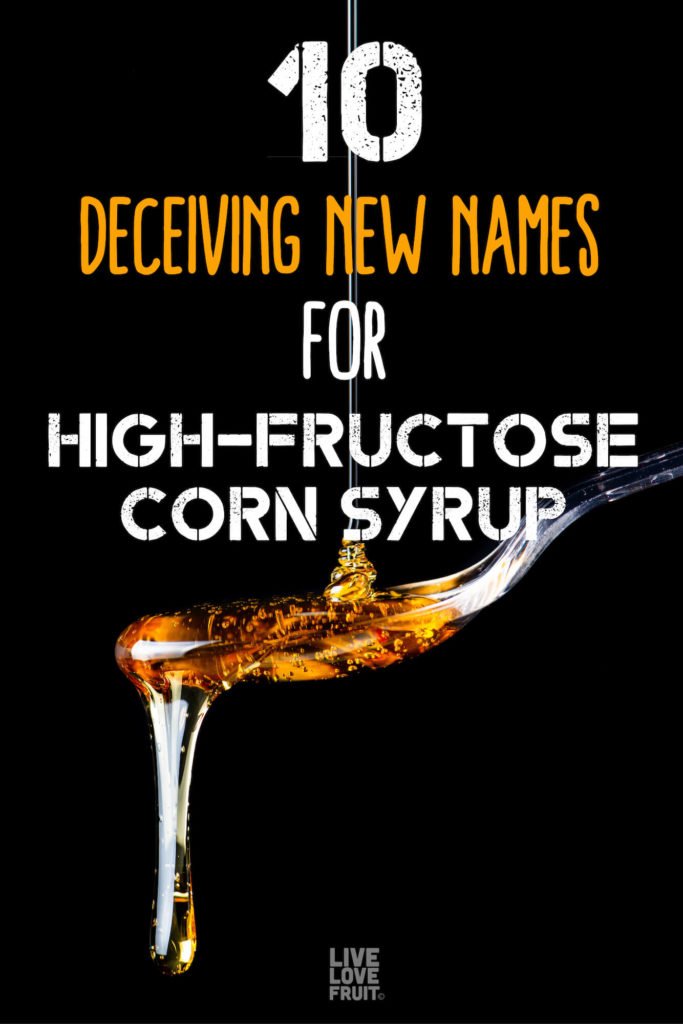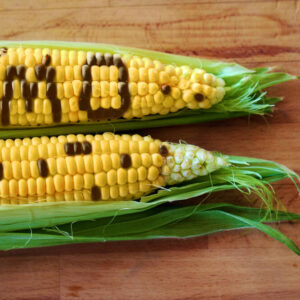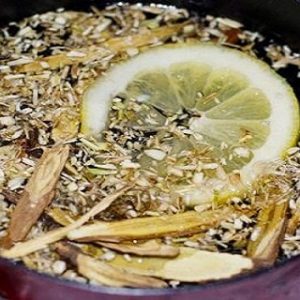
As consumers become more health-conscious, their preference for certain ingredients has weeded out the really bad ones – like high-fructose corn syrup. But what many people aren’t aware of is that high-fructose corn syrup has been given a new name – something that is actually sabotaging the well-intentioned health goals of millions.
As a result of the health-demands of consumers, companies are listening. They’re plastering “100% natural” or “fat-free” on their products, thinking that people will use this as a guide that a product is okay, instead of taking a look at the ingredient list.
Or, even more sneaky, companies have decided to take ingredients that have a bad health-rep and rename them something else – like “glucose syrup” or “fructose” in replacement of “high-fructose corn syrup.”
What is High-Fructose Corn Syrup?
High-fructose corn syrup is a liquid sweetener made from cornstarch. It is made by breaking down corn into molecules of glucose (a type of sugar). Half of the glucose molecules in HFCS are then chemically changed into fructose (hence, you can see why the fructose in HFCS is also chemically different than the natural fructose found in fruit).
New Name – Same Thing
Marketers know the power a name wields in causing sales to either increase or plummet. In the 80s, low erucic acid rapeseed oil was renamed canola oil, and prunes (a name associated with many trips to the bathroom) are now allowed to be called dried plums. However, this latest name change is by far the most deceptive.
As the word got out about the adverse health effects of high-fructose corn syrup (HFCS), consumers started reading labels and looked for products that didn’t contain HFCS. In fact, a survey in 2014 by the Nutrition Business Journal found that HFCS tops consumers’ least-wanted list (1). Number two was partially hydrogenated oils (aka. “trans fats).
It’s said that corn refiners have spent nearly $50 million trying to convince the public to accept corn sugar as HFCS’s new namesake (2).
Take General Mills’ Vanilla Chex, for example. It’s an updated version of the Chex cereal sold in most conventional grocery stores, and the front of the new box states that the product contains “no high fructose corn syrup.” However, if you turn the box around to read the ingredient list, you’ll see that HFCS was simply renamed as a new fructose isolate.
Why is this a problem? According to the Corn Refiners Association (CRA), the term “fructose” is now being used to denote a product that was previously known as HFCS-90, meaning that it is 90 percent pure fructose. If you compare this to regular HFCS, which contains 42 to 55 percent fructose, you’ll know why General Mills and so many other companies want to keep you in the dark.
The food ingredient now called “fructose” now contains even higher concentrations of one of the primary components within HFCS, which is linked to major health issues. Rather than being a healthier product, it is even more of a health risk than regular HFCS.
CRA explains:
“A third product, HFCS-90, is sometimes used in natural and “light” foods, where very little is needed to provide sweetness. Syrups with 90% fructose will not state high fructose corn syrup on the label [anymore], they will state ‘fructose’ or ‘fructose syrup.’”
The way they get away with this is simple:
“Simply eliminating the high fructose corn syrup designation for the laboratory sweetener that’s nine-tenths fructose and calling it what it really is: fructose. And that’s how a processed-food product like Vanilla Chex that contains “fructose,” a substance that, according to the corn refiners, used to be called HFCS-90, can now declare itself to be high fructose corn syrup-free (3).”
Since the FDA hasn’t recognized HFCS-90 (aka. “fructose) as safe, how can companies use it in their products? The FDA has devised a term called “generally recognized as safe” or GRAS, which is a quick and easy way to exempt common food additives from major review. Out of an estimated 10,000 ingredients in processed foods, 3,000 have not been reviewed by the FDA for safety. Fructose is just one of those ingredients in this untested group.
Fructose in Fruit vs. Fructose in HFCS
I also wanted to get it out there that the fructose in fruit is much different than the fructose in HFCS. When someone eats a piece of fruit, they consume naturally-derived fructose, along with fibre, enzymes, minerals and vitamins. Conversely, when someone consumes the highly-refined fructose in HFCS, they are ingesting very high concentrations of it with the total absence of the healthful components that come with eating fruit.
10 Deceiving New Names for High-Fructose Corn Syrup
The corn industry continues to defend high-fructose corn syrup by spending millions on commercials. In their advertising campaigns, they claim that medical and nutrition experts have determined it is not unhealthy. That it is “no different than regular sugar”. Except, it is.
Because the name has such a bad rep, many food manufacturers utilize these names instead so that people don’t question and purchase the product:
1. Maize syrup
2. Glucose syrup
3. Glucose-fructose syrup
4. Tapioca syrup
5. Fruit fructose
6. Crystalline fructose
7. HFCS (the same name, just the shortened version)
8. Isoglucose
9. Corn syrup
10. Dahlia syrup
When it boils down to it, these all impact the body the same way high-fructose corn syrup does. Always read your labels before purchasing a product!
What Foods Contain HFCS?
Many popular foods contain HFCS or derivatives of the name (re: alternative names mentioned above). Everything from fruit juices to cereal, high-fructose corn syrup is laden in foods you might have originally thought safe.
Here are some foods that very likely contain HFCS that might surprise you the most:
1. Cereal: many seemingly healthy cereals contain HFCS. Think about all the sugary cereals in the grocery store (even granola). They likely contain a highly modified sugar source (Frosted Flakes, anyone?). Cereal bars like Pop Tarts and Toaster Strudels are also laden with the stuff.
2. Juice Cocktails: if the product does not say 100% juice on the label, it is probably full of high-fructose corn syrup. The most suspect here are juice cocktails that are often 99% sugar and 1% real fruit juice. Always read the ingredients on your fruit juices and make sure there are no added sugars.
3. Soda: while soda isn’t really healthy to begin with, and there are a variety of reasons why you probably shouldn’t be drinking it, I’m still going to add it to the list. Many sodas contain HFCS. Alternatively you can drink sparkling water with a fresh squeeze of lemon or lime. Many health food stores also have soda alternatives that use cane sugar instead of HFCS.
4. Yogurt: sweetened yogurts are also culprit to the ingredient HFCS. You’ll mostly only find this in regular dairy-based yogurts, so instead of eating those (and subjecting yourself to the mucus that’ll come from eating it), opt for plant-based yogurts. Coconut yogurt is one of my favorites, and you can even make your own to boot!
5. Syrups: this probably doesn’t surprise you! Many sugary syrups are loaded with HFCS or derivatives of the modified sugar. Think of things like Aunt Jemima, Hershey’s Chocolate Syrup, or any other ‘pancake syrup’. They’re all pretty much some version of corn syrup with added flavors. Always choose 100% pure maple syrup, agave or natural chocolate syrups you can find at the health food store.
6. Bread: while it is mostly white bread that you need to watch out for here, some whole wheat brands might also sneak it in. Other baked goods like cookies, muffins and pies might also have some form of HFCS in their ingredient list. Opt for home-baked breads like this gluten-free buckwheat bread, or some anti-inflammatory sweet potato muffins!
7. Condiments: condiments like ketchup and salad dressings are often laden with different kinds of sweeteners. Heinz ketchup, for example, is known for being loaded with HFCS. Barbecue sauces and marinades are also suspect. Ingredients on salad dressings from companies like Kraft and store-name brands should also be inspected before purchase. The good news is, is that there are many natural and organic condiment brands out there. Companies like Annie’s Naturals, and Trader Joe’s make great alternatives.
8. Jams & Preserves: you might think your favorite brand of jam is HFCS-free (after all, it’s just fruit, right?), but that often isn’t the case. Mass-produced jams are full of corn-based sweeteners. Instead, make your own jam by cooking down 2 1/4 cups of chopped berries, 3 tbsp. coconut sugar and 1 tbsp. chia seeds. Simmer for 10-15 minutes, and once it has thickened, remove from heat to cool down. Add 1 teaspoon pure vanilla extract, and let cool in the fridge for 15-30 minutes.
Dangers of High-Fructose Corn Syrup
There is a growing body of scientific evidence that HFCS causes a variety of health issues. Below are just a few health effects of consuming HFCS.
1. Obesity
While most refined sugar isn’t good for the body, a Princeton University study found that HFCS causes more weight gain than refined sugar does. When controlling for caloric intake, the researchers found that animal subjects who had access to HFCS put on significantly more weight than those with access to table sugar. They also found that HFCS led to abnormal increases in body fat, especially in the abdominal region, with increases in triglyceride levels (4).
2. Heart Disease
HFCS is a known contributor to all sorts of cardiovascular problems. To start, it raises cholesterol and triglyceride levels (5), and has also been found to be associated with high blood pressure levels (6). The fact that HFCS does these two things is enough to make it extremely bad for your heart. High blood pressure is part of a cluster of health issues called metabolic syndrome, which increases your risk for heart disease, stroke and diabetes.
3. Diabetes
Fructose has been directly linked with diabetes, especially HFCS, which contains an exuberant amount of free-floating fructose (remember, this is the bad fructose – not the stuff you get from eating fruit). Recent data has found that refined-fructose consumption in humans leads to impairment in the regulation of fats in the blood (like cholesterol and triglycerides) and decreased insulin sensitivity. These effects, of course, increase your risk of developing type II diabetes (and cardiovascular disease) (7).
4. Digestive Health
HFCS is a major trigger for leaky gut syndrome. Research done at the Children’s Hospital Oakland Research Institute found that free-floating fructose from HFCS requires more energy to be absorbed by the gut, depleting the energy source needed by our gut to maintain the delicate intestinal lining. Large doses of free-fructose have been shown to increase intestinal permeability, essentially creating a leaky gut (8). Once our gut is leaky, our body becomes inflamed, and inflammation triggers a host of different diseases and illnesses.
5. Cancer
Research from 2010 published by the American Association for Cancer Research found that fructose in HFCS promotes cancer growth, specifically pancreatic cancer. This research found that cancer cells readily metabolize fructose and induce rapid reproduction of pancreatic cancer cells (9). It’s best to stay away from anything containing HFCS if you’re wanting to protect yourself from cancer.
6. Heavy Metals
Many studies have found exorbitant amounts of mercury in products containing high fructose corn syrup, which of course, is a dangerous heavy metal that can contribute to dangerous mercury poisoning. Mercury has negative effects on the liver, kidneys, brain and other organs. A study published in Environmental Health found mercury in over 50 percent of the samples tested from commercial high fructose corn syrup’s. Other studies have found mercury in over a third of 55 popular brand-name food and beverage products like Kraft, Quaker, Hershey’s and Smucker’s (10).









It should read Jams and Preserves, not James and Preserves.
Whoops, that was a typo. Thanks for mentioning!
This article is misleading. I’ve read that most HFCS, unless otherwise stated, is usually 45% to 55% fructose and the rest is glucose. Regular table sugar, sucrose, is 50% fructose and 50% glucose, so it is nearly the same as HFCS. this means that most of the evils your article attributes to HFCS are also applicable to regular table sugar (sucrose). So it would seem that only the more highly concentrated preparations of fructose might subject one to additional risks beyond those in regular sugar. It would be better if your article emphasized avoiding ALL sugars — table sugar (sucrose) as well as HFCS and all other syrups with the exception of pure corn syrup. Pure corn syrup is 100%% glucose and that would probably be the healthiest of all the sugars but I’ve not seen any studies that attempt to confirm this.
Hey Warren, this article is dedicated to high-fructose corn syrup. Yes, regular table sugar is also bad too, but I talk about that in other articles dedicated to table sugar.
You do realize that the corn being used is GMO to start with…So with that being the facts I would say there is nothing good about ingesting any form of fructose that is unless you eat only GMO free fruit.
Do you have any information on Tapioca syrup being made from corn instead of a cassava plant?
Tapioca syrup does come from the cassava plant, but they’ve modified it so much that is acts like HFCS in the body.
Thank you! I am allergic to corn ( I even react to Ascorbic Acid (pure vitamin C powder) when derived from or processed with corn). I do not react to tapioca, which is why I inquired about whether there was tapioca made from corn.
Invert sugar is also a bait and switch name for HFCS.
Good to know!
In 2013 I lost 60 lbs and all I did was eliminate HFCS from my diet. I kept it off till 2019. Since the 2019 changes it is impossible to track in foods now. Two years later and I have gained 40 of the 60 back.